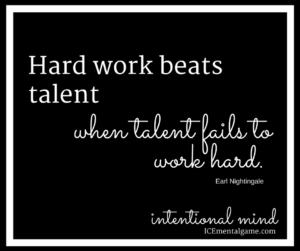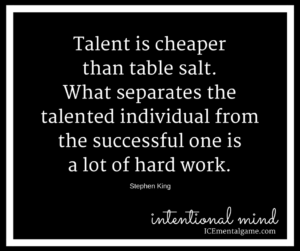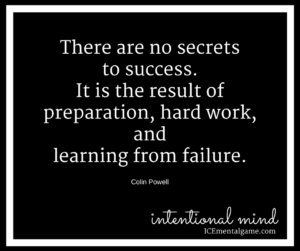 If you have been around the sports world long enough, you have read Michael Durant’s famous quote: Hard work beats talent when talent fails to work hard.
If you have been around the sports world long enough, you have read Michael Durant’s famous quote: Hard work beats talent when talent fails to work hard.
When I was younger I thought that I would find, somewhere in the world, the one thing I was meant to do. I would be a champion, an expert in that area.
How would I find it? I would know because I would have a talent for it. My talent would guarantee my success. My talent meant that mastery would be easy. No super hard work necessary.
Maybe you feel this way too.
I was a pretty talented little kid. Things came easy to me, and I did many things well.
But as I advanced in the activity, I would hit a wall, something that I couldn’t do, even with a “little practice”.
I would try to get better without success, then think to myself “I guess I am not talented in this, because if I were, it would be easy. So I quit and looked for something else.
Many skaters find these “walls” at the axel, or the double axel.
These jumps often require more practice than the others. If a skater doesn’t understand that with practice they will eventually master the axel (2A), they might decide that they are not “talented” in skating and give up to find something that comes more “naturally.”
In my journey as a child, I kept searching for the one thing that I was “talented” in beyond all others. The one thing I was meant to do. The one thing in which I could be a champion.
 I would know it when I found it because everything would come easily.
I would know it when I found it because everything would come easily.
My little kid brain didn’t understand that talent is not the end, but only the beginning. In order to master something, you must learn, practice and improve beyond your natural talent.
As a Mental Game coach, I have the opportunity to teach my students that talent is great if you have it, but that hard work will take you to many more places than talent ever could.
I am grateful for the opportunity to share this truth so that you can stop searching for that one thing in which you are talented beyond everyone else (it doesn’t exist), and give yourself permission to find something you love to do, and enjoy working towards mastery.
Now I teach my students that the famous people they see online, on TV, or in the news might have had natural talent when they started on their path, but they all had to work hard to reach the top of their professions.
When you see successful young athletes and skating champions, you might be tempted to think “how lucky they were to be born talented.” When I was a child, I did.
No one told me that when I saw a competitor win a gold medal at Nationals or play a solo in a band concert, that I was only seeing their highlight reel.
That if I was allowed to peek behind the scenes, I would see years of preparation, sweat, tantrums, sacrifice and time devoted to practice and mastery of their craft. Talent gets you started, but success is build through practice and work.
In order to be the best an anything, you must put in time and effort. Talent will only take you so far.
Need more proof? Here’s a story of a very famous athlete:
Most people have heard Michael Jordan1 talk about getting cut from his varsity basketball team. Sophomores rarely got to play on the Varsity team, but that same year he was cut, his friend, 6’7” sophomore Leroy Smith was included on the team.
Michael Jordan found out he was placed on the JV team, but that night he went home, locked himself in his room and cried. At that time he had a choice to make, to step up and be the greatest JV basketball player ever, or to give it up because he wasn’t “good enough, or tall enough.”
Good thing for us and for the NBA that he made the choice he did. He was a star starter on the JV team and ended up playing much more than he would have on the Varsity team.
To this day, he continues to talk about this incident in his life and how he used it as motivation to push himself to work hard and become unstoppable.
If your dedication to skating has fluctuated with your performance at the last competition or how successfully you landed your jumps today, I challenge you to stop wasting your time and make a commitment to yourself.
 First of all sit quietly and say these words to yourself (really mean it):
First of all sit quietly and say these words to yourself (really mean it):
“I forgive and myself for believing that everyone in the world has more talent than I do.”
“The truth is, natural talent is a very small part of success. Success takes work, and boy I can work!”
Every day for the next 7 days: wake up excited that you “get” to skate.
If you don’t feel excited, then get excited. Think about all the wonderful things you love about being on the ice.
Commit to making each moment on the ice count toward improvement.
Here are some sample intentions. You can use these or make up your own.
I intend to practice to improve a little more today.
I intend to enjoy my time on the ice.
I intend to pay attention to myself and never mind what other people are doing.
After the first 7 days, do it another 7 and…create a new habit!
Shoot me an email or comment on my ICE Mental Game FB page or Twitter and let me know how you are doing.
- Samantha Grossman, “A Myth Debunked: Was Michael Jordan Really Cut From His High-School Team?,” Time, January 16, 2012.
